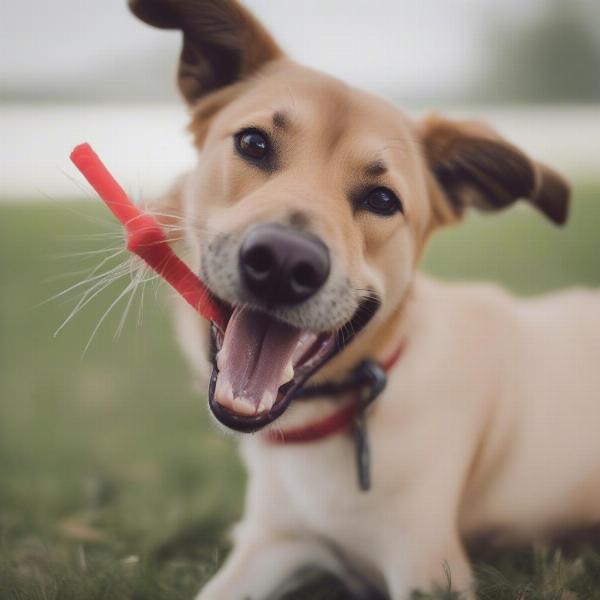Discovering your dog has ingested a used tampon can be alarming. This behavior, while unsettling, is not uncommon in dogs, especially puppies and those prone to scavenging. Understanding the reasons behind this behavior and knowing what steps to take is crucial for your dog’s safety and well-being.
Why Do Dogs Eat Tampons?
Several factors can contribute to a dog’s interest in tampons. One of the most common reasons is simply curiosity. Dogs, particularly young ones, explore their world through their mouths. The scent and texture of a tampon, especially a used one, can be intriguing to them. Another factor is scavenging behavior. Dogs with a strong scavenging instinct are drawn to unusual smells and may ingest things they shouldn’t. Boredom and anxiety can also play a role, leading to destructive behaviors like chewing and ingesting non-food items. Finally, medical conditions like pica, a disorder characterized by the persistent eating of non-nutritive substances, could be a contributing factor.
“Dogs, especially puppies, often explore their environment with their mouths. A used tampon can be appealing due to its scent and texture,” says Dr. Emily Carter, DVM.
What To Do If Your Dog Eats a Tampon
If you witness your dog eating a tampon, the first step is to remain calm. Panicking can exacerbate the situation. Try to retrieve any remaining pieces of the tampon and contact your veterinarian immediately. Explain the situation and follow their advice. They may recommend inducing vomiting or monitoring your dog for signs of distress.
Potential Risks and Complications
Ingesting a tampon can pose several risks to your dog’s health. The string can become lodged in the intestines, causing a blockage that requires surgical intervention. The absorbent material of the tampon can also expand in the stomach or intestines, leading to gastrointestinal obstruction. Signs of obstruction include vomiting, diarrhea, lethargy, loss of appetite, and abdominal pain. In severe cases, untreated obstruction can be life-threatening.
“A tampon lodged in the digestive tract can cause serious complications. Prompt veterinary attention is crucial,” warns Dr. David Miller, DVM.
Preventing Future Incidents
Preventing your dog from accessing tampons is the best way to avoid potential problems. Store tampons, along with other feminine hygiene products, in a secure location out of your dog’s reach. Ensure trash cans are securely closed or kept in a locked cabinet. Provide your dog with plenty of appropriate chew toys and engage them in regular exercise and mental stimulation to reduce boredom and anxiety.
 Dog playing with a chew toy as a distraction
Dog playing with a chew toy as a distraction
How Long Does It Take for a Dog to Pass a Tampon?
dog ate tampon how long to pass
The time it takes for a dog to pass a tampon can vary depending on the size of the dog, the size of the tampon, and the individual dog’s digestive system. It can take anywhere from a few hours to several days. Even if your dog seems fine, it’s essential to monitor them closely for any signs of distress and contact your veterinarian for guidance.
Conclusion
If your dog ate a tampon, swift action is essential. Contact your vet immediately, and they can guide you on the best course of action. By understanding the reasons behind this behavior and taking preventive measures, you can help keep your furry friend safe and healthy.
FAQ
- What should I do if my dog ate a tampon a few days ago and is now vomiting? Contact your veterinarian immediately. This could be a sign of a serious complication.
- Can a dog pass a tampon on its own? Sometimes, but it’s best to consult a veterinarian as there are risks involved.
- My dog ate a tampon string, what should I do? Contact your vet immediately. The string can cause a dangerous intestinal blockage.
- Are there any home remedies for a dog that ate a tampon? No, inducing vomiting at home without veterinary guidance can be dangerous. Always consult your veterinarian first.
- How can I prevent my dog from eating tampons again? Store tampons securely out of your dog’s reach.
- What are the signs of an intestinal blockage in a dog? Vomiting, diarrhea, lethargy, loss of appetite, and abdominal pain.
- Is pica common in dogs? It can occur, and it’s essential to discuss any unusual eating habits with your veterinarian.
ILM Dog is a leading international online resource for dog owners, offering expert advice on all aspects of dog care and well-being. From breed selection and puppy care to senior dog health and training, we provide reliable, practical information to help you nurture a happy, healthy canine companion. Our expertise covers dog breeds, health, training, nutrition, grooming, and much more. For professional guidance tailored to your dog’s specific needs, contact us at [email protected] or +44 20-3965-8624. Visit ILM Dog for more helpful resources and expert advice.